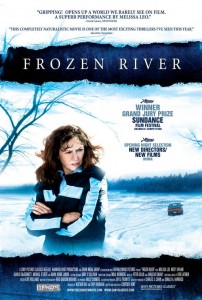“No it’s not.” “Yes it is. Just hold it close to your body. Keep it warm. We don’t want to give it to her cold.”
After discovering the child is alive Lila says, “It wasn’t me it was the Creator,”
to which Ray says, “All I know is K-Mart’s closed and I don’t have nothin’ for under the tree.”
Motherhood: the dogged determination to the death that says I will provide for my children no matter what. Life may hit me with its best shot but I will find a way through, over, around.
Flint-like resolve in her scared momma’s eyes, Melissa Leo’s Academy Award Nominated performance demands to be watched by everyone born by a mother. Each scene is tension filled because every act of life is played on the precipice. We are required as viewers to live on the ledge, to feel what it is like to scratch and claw for every piece of change making sure our kids eat lunch. We will be asked to consider what we would do were we the lone decision maker in a household. We will look face to face in the face of women who must face the world on their own. And we are forced to look at our faces in the mirror of our own souls.
Directorial debuts seem to produce soul-searching films (i.e., Alejandro Gomez Monteverde for Bella, Gavin Hood for Tsotsi, Florian Henckel von Donnersmarck for The Lives of Others to name a few). Courtney Hunt’s freshman project is worth thoughtful reflection and deep group discussion.
Frozen River takes the cinematography of daily life (think The Office) to create a world the common person knows: no makeup and no spectacular production designs. Dollar stores and house trailer living are par for the course here. Forget politics. Fortunately, social commentary is no where to be found. [Would that Hollywood would get the point: “Just tell the story.”]
But we will be haunted for days after to consider what would we do were we confronted with . . . deadbeat dads, human smuggling, hand-to-mouth living, insufficient work, latch-key children, and credit card fraud. An odd couple, Lila (Misty Upham) and Ray (Leo) find themselves joined at the hip through actions to which they must simply respond. Two women from different cultures connect through their common humanity. Even tribesmen and troopers are presented as compassionate beyond the normal Hollywood cut-out characters. The frozen river stands as the metaphor, harboring either hope or peril.
Were I to create a movie trailer, it would be the opening paragraph above, which makes no sense until you see the movie; which is what I want you to do. We must place ourselves into the middle of a tunnel where an oncoming train forces us to make decisions these mothers make every day.
Lila and Ray both seek provision for children. Their coupled, selfless deed mid-film makes every heart ache. Acting to redeem a life or care that a child receives a Christmas present transcends personal interest. Parental trauma cannot be reproduced. Those who suffer in some way to care for children feel the pain of Frozen River, hoping for a thaw.
Rated R for brief use of profanity and adult situations.
Mark was raised in upstate New York and understands winter cold. He now teaches at Capital Seminary & Graduate School.

